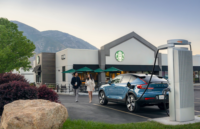Study Claims EV Adoption Targets Are Unachievable

ZURICH—According to a study commissioned by ABB Robotics, more than half (59 percent) of respondents believe the shift to pure electric vehicle production is not achievable within current legislative timelines.
Challenges include adapting to a new battery supply chain, concerns over high levels of capital investment required, shortages of raw materials, suitable infrastructure and lack of grid capacity.
Although 28 percent of respondents say the deadlines are achievable, 18 percent believe the present targets will never be met. Only 11 percent think all regional targets for EV adoption by 2040 are realistic.
“The automotive industry is acutely aware of the stresses and strains involved in meeting the proposed regional timetables for reaching full EV production,” says Joerg Reger, managing director of ABB Robotics Automotive Business Line.
“Automation is key to making production more resilient, efficient and faster to meet these targets, which is why we’re seeing high demand for robots that specialize in EV power train assembly,” notes Reger. “These solutions radically reduce build times, improve flexibility, further simplify the production process and ultimately drive down production costs.”
The survey also highlighted the challenges involved in adapting to a new battery supply chain, cited as a key barrier by 19 percent of respondents, while 16 percent have concerns over the high levels of capital investment required. Shortages of raw materials, suitable infrastructure, and lack of grid capacity were also high on the list of issues yet to be resolved.
Elsewhere, the lack of charging infrastructure was quoted as the single biggest constraint to EV adoption by more than a quarter (26 percent) of those surveyed, while 17 percent highlighted high vehicle prices as the principal barrier to EV growth.
“The survey confirms…that manufacturing is under strain and disrupted supply chains are under considerable stress,” says Daniel Harrison, an analyst at Automotive Manufacturing Solutions, which cosponsored the study. “This is likely to be the ‘new never normal,’ which poses considerable challenges to how quickly the industry can transition to electrification and also wider manufacturing sustainability targets, especially during a period of great economic uncertainty.”
Looking for a reprint of this article?
From high-res PDFs to custom plaques, order your copy today!






